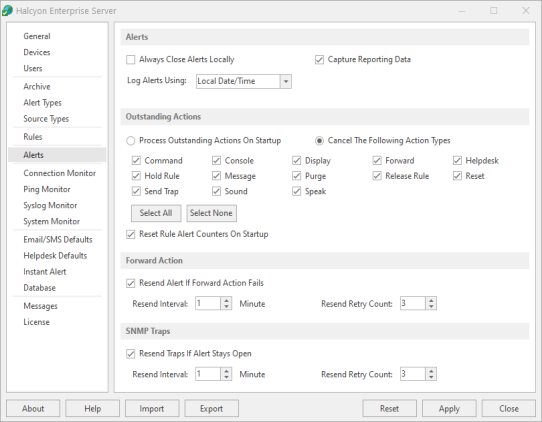Enterprise Server Options - Alerts

The Alerts tab of Enterprise Server Options is used to set global options for alert actions.
Alerts section
Always Close Alerts Locally
Check to enable the ability to close alerts locally even if an error occurred while trying to close or reply to an alert on the originating remote device.
Log Alerts Using
This setting allows you to choose whether alerts are logged using the local date and time at which the Enterprise Console received the alert or the remote date and time of the device from which the alert was sent.
Outstanding Actions section
Settings in this section determine what happens to any outstanding actions when opening a session of Enterprise Console. Outstanding actions can either be processed or canceled. Individual actions and action types can be included or excluded from the instruction.
Process Outstanding Actions on Startup
Select this option to specify that all pending actions are executed upon starting a new session of Enterprise Console. No further action selection is required.
Cancel The Following Action Types On Startup
Select this option to activate the following action types that can then be canceled when the Enterprise Console service is restarted. If this option is selected and an action type in this section is left unchecked, the outstanding actions are processed on restart. This allows, for example, leaving all outstanding Console actions to be processed upon restart.
- Message: Select this option to cancel all outstanding message actions.
- Display: Select this option to cancel all outstanding display actions.
- Sound: Select to cancel all outstanding sound actions.
- Speak: Select to cancel all outstanding speech actions.
- Reset: Select this option to cancel all outstanding reset actions.
- Command: Select this option to cancel all outstanding command actions.
- Console: Select to cancel all outstanding Console actions, such as Close, on restart.
- Send Trap: Select to cancel all outstanding Send Trap actions.
- Forward: Select this option to cancel all outstanding forwarding actions.
- Hold Rule: Select this option to cancel all outstanding hold rule actions.
- Release Rule: Select to cancel all outstanding release rule actions on restart.
- Help Desk: Select to cancel all outstanding Help Desk actions on restart.
- Purge: Select this option to cancel all outstanding purge actions.
Select All
Click Select All to select all of the Action Types to be canceled on start-up of the Enterprise Console.
Select None
Click Select None to specify that all of the Action Types are processed on start-up of the Enterprise Console.
Reset Rule Alert Counters On Startup
Check this box to specify that all rule counters are reset back to zero when starting a new session of Enterprise Console.
The system remembers the current count of all active rules so for example, if a counter has an action of sending a message on the third instance of being raised and the current count is two, the system will reset this setting back to zero if this option is selected.
This section is used to define what happens to forwarded alerts that fail to reach their target destination.
Resend Alert If Forward Action Fails
Select this option to ensure that any alerts that are raised with the forward action, are resent if the initial forwarding action fails.
Resend Interval
Specifies the time delay (in minutes) in re-sending forwarding alerts that fail the initial action. The default setting is 1 minute.
Resend Retry Count
Specifies the number of times that the resend action is attempted. The default setting is 3 attempts.